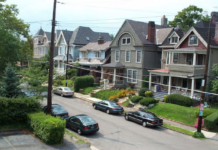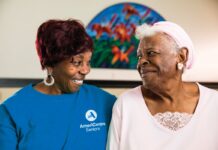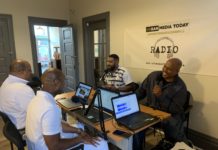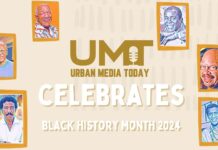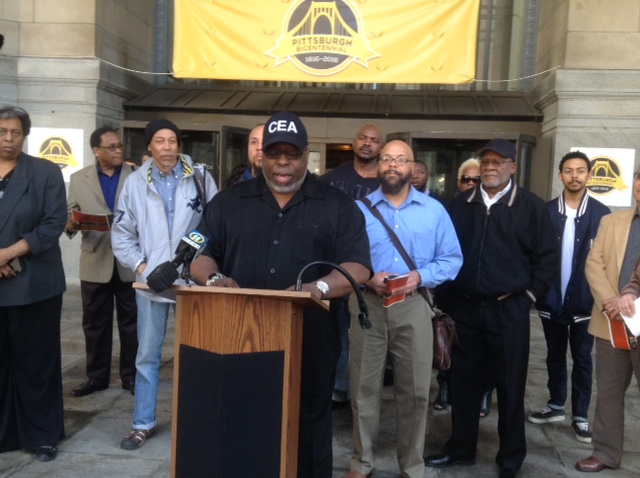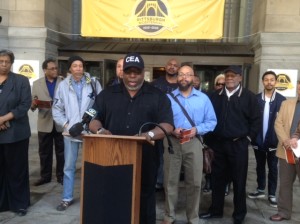
“Contrary to some opinions, murder and social isolation do not come naturally to nor are inherent in one group of people,” says Rashad Byrdsong, President and Chief Executive Officer of Pittsburgh’s Community Empowerment Association. “Filled with disparities in education and lack of economic opportunities, paired with substance abuse and underemployment, violence springs from the hopelessness of people who have been marginalized, dehumanized an prevented from the rights of full citizenship.”
Byrdsong held a press conference on the steps of the City-County Building, Downtown on Tuesday morning prior to a public hearing before City Council asking that body to codify requirements to include community members, particularly those in low-income and African-American neighborhoods, in planning, constructing and participating in redevelopment of those neighborhoods.
Even before the development of the Bakery Square complex in East Liberty, Byrdsong and other community activists have expressed concern that new developments displace long-term residents without providing benefits in return for neighborhood sacrifices. Families who have lived for generations in the Hill District, the North Side, the South Side and those east end neighborhoods are being displaced, forced to leave the City for suburban areas.
Emotions were high in Council Chambers as witnesses before Council offered testimony about how “institutional policies and practices exclude black people from economic development opportunities,” according to Byrdsong.
The racial disparities in employment which lead to higher rates of poverty among the City’s black population are unacceptable, Byrdsong says, saying there is no equity without justice, the legal requirement that every person receive the same treatment.
“We must begin to look to racial equity tools that will begin to decrease the disparity,” Byrdsong says. “We al carry bias, and acting on bias can be discriminatory and create negative outcomes. Today, we see racial bias manifested in institutional policies, practices and procedures.”
“We are requesting that City Council create an ordinance for the City on Community Benefits Agreements,” Byrdsong says. “CBAs are complex, multi-party contracts executed by several community-based organizations and one or more developers, including commitments to provide a range of community benefits related to a proposed project.”
Such agreements, Byrdsong says, promote inclusiveness by ensuring community concerns are heard and addressed, enhancing both accountability and trust through legally-binding means.
Participants also requested Community Impact Studies as required documentation before City agencies such as Planning or the Urban Redevelopment Authority approve any new developments.
“Community Impact Reports are tools to provide the public and elected officials with pertinent information about both positive and negative impacts of development projects prior to approval,” Byrdsong says. “Too often, community leaders find themselves excluded from the process and information about projects; developers are reluctant to share too much information; and local officials struggle with competing interests and demands.”
This lack of communication often results in projects which meet the needs of few in the neighborhood, at a high cost to those same neighbors and to other taxpayers City-wide.
Byrdsong says the ordinance has widespread support in neighborhoods around the City, not only in Homewood or East Liberty.
“City-wide, the black community has been working together to demand change. City-wide, we have supported efforts in demanding opportunities and inclusions,” says Byrdsong.
Zeva Amed of the North Side says she has heard many questions about projects in that area and what might have been going on.
“The idea of the Community Impact Report sounds good, because it will be a good way for community members to find out what the plan is for their neighborhood,” Amed says. “Government processes and any developments that happen in the City of Pittsburgh should benefit the residents who live in the City, and that is all of them. Residents should be given as much information as possible.”
Amed notes that the current administration has made attempts to ensure community involvement in development processes, but that many residents don’t fully understand how things work.
“I’ve noticed that education about how City Council and other government processes work is not something taught to the public in general, so none of us really know how things work and how it should be done,” she says. “If it’s about things that affect you, that’s a problem that needs to be addressed.”
East Liberty resident Carmen Brown says the development in her community does not include the people in her community.
“They come in, buy up the land, and hold it for certain developers to come into our community,” Brown says. “We don’t have a say-so in anything that happens. We don’t have any protection. Who is protecting us? We need some protection, and this ordinance would help us. And I am talking about the ones who have been there, not those coming in from out of town.”
Jackie Smith of the Human Rights City Alliance says the proposal meets the definition of legislation for a “human rights city.”
“We believe that Pittsburgh is not about our buildings, or the businesses we attract, it’s about our people,” Smith says. “The essence of our city is being pushed out, and that is the most egregious violation of human rights. The City needs to take some thoughtful action to reverse those patterns. We need to make our residents a priority, and make sure everybody can thrive and be full members of our society.”
Ronelle Guy of Pittsburgh United says she has been coming to Council for nine years asking for legislation similar to that proposed Tuesday.
“This is not the first City Council has heard of this,” Guy says. “Do it because it’s the right thing to do. Government should be the equalizer. You know there is structural racism in this city.”
Yvonne Rainey of the North Side Fair Housing Coalition says she came to Pittsburgh from the South 30 years ago.
“These are our communities. We are vested in our communities, and we have to come to you because we elected you to speak for us,” Rainey says. “Are you representing us? I am asking each and every one of you who has been elected to represent us to make it happen.”
“Fifteen years ago, I had never even heard of the word ‘gentrification,’ yet for the past 15 years I have been living it,” says East End native Alethea Sims, President of the Coalition of Organized Residents of East Liberty. “I have seen all kinds of development come in that has not helped us.”
Brandon Rice of Homewood says the young people of the City are not afforded the opportunities given most other people.
“The people here who have jobs and are successful are from Virginia. They are from Chicago, Detroit,” Rice says. “I’d like to see more resources given to these communities, not just the East Side, not just Homewood. I was born on the North Side, and I see so many of the places I used to shop at closed, boarded up. I’d like to see that come back.”
Rice also says educating youth about the political process is imperative.
“If you don’t educate these young people, well, they are the ones who will be supposed to take care of you, and you don’t want ignorant folks being responsible,” he says.
Council Representative Theresa Kail-Smith says she finds the idea of the agreements interesting, but would like to know more about how they would work with respect to residents who might be outnumbered but have lived in communities for many years.
“We also have to be realistic about what we legally can do,” Kail-Smith says. “We are superseded oftentimes by state and federal law. But I want to make sure that the voices of people who have lived in a community for a long time are heard.”
“When you talk about access to information, that’s something we [on Council] have asked for,” Kail-Smith says. “Quite honestly, we don’t always receive that information. We got information about a 115-room hotel building, after the fact. I live in a community too, and I’d love to get the information as well.”
“I know there is a lot of frustration, but I hear what people are saying. I think we all want to see this happen.”
Council Representative Daniel Lavelle says Community Benefits agreements can be done, and can be beneficial based on his own experience working with the development of the 28-acre former Civic Arena site.
“In that agreement, we have mandated levels of people from the community to [work] on that site, we have mandated levels of minority and women’s participation in terms of job opportunities and business development,” Lavelle says. “We have mandates for affordable housing, we have mandates for a minimum of small, women-owned retail businesses from the community on the site. We have put together a reinvestment fund that will deploy approximately $20 million back into the community. So, what you are asking can be done. I support your call, your concerns, and your ‘ask.’”
“I also want to make you aware that some of what you are asking is actually being worked on now before Council,” Lavelle says. “Last year, myself and Councilman Burgess, with the support of all Council, passed Source of Income legislation so people can’t discriminate against people with Section 8 vouchers or other sources of income to get housing.”
“Currently before City Planning is an impact statement requiring developers to say what their development is going to do, and how it will affect affordable housing,” Lavelle says. “There are things currently being done. I co-chair the Affordable Housing Task Force for the City, which is in the process of having city-wide meetings.”
Affordable Housing Task Force meetings are scheduled for Tuesday, March 15 at the Knoxville Life Center; Wednesday, March 23 at the Letter Carriers’ Building on the North Side; Tuesday, March 29 at the Kingsley Association in Lincoln-Larimer; and Tuesday, April 5 at the Kaufmann Center in the Hill District. All meetings begin at 6 pm.
“I think it is very important for you to come out and keep sharing your stories,” says Council Representative Natalia Rudiak. “We live in one City, but we live in so many different Pittsburghs. It is important to tell the whole story of what this agenda is.”
“We are trying to figure this out. We were not prepared for this,” Rudiak says. “Fifty years ago, we never could have imagined that we would have developers coming in literally building hundreds of millions of dollars in developments. So we don’t have a magic bullet, but I think we can keep working together.”
“It’s always about the buildings, and we forget about how the ‘built environment’ affects the people,” Rudiak says. “I think the next Renaissance that needs to happen is a people renaissance.”
“I am in my ninth year on Council, and we have seen Councils which have served you well, and have not served you so well,” says Council President Bruce Kraus. “Much of the work we do, you don’t necessarily see, our frustrations that the goal is further away than we would like. I promise you that you have me as an ally, and I am here to tell you that this body is here as your friend and your ally, because we truly want to see a City for All. It is people who make a city, and the City is nothing without you.”
“I have been arguing that Pittsburgh should be a City for All, which means making Pittsburgh livable and affordable for everyone,” says Council Representative Ricky Burgess. “There are four components I have been trying to articulate, to push: One, affordable housing for everyone; two, living wage jobs for everyone; three, safe streets for everyone; and four, good schools for everyone. Those four things are the pillar of all the things we are trying to do together.”
“I am extremely concerned about displacement,” says Burgess. “I have seen the East End change. We need a process of protecting people who have lived in these communities all their lives. You should be able to stay in your community as long as you like, and we need a process to do that.”
“I have listened, and having a Community Benefit Agreement of some sort, we can look at and I will support,” Burgess says. “But the real thing we should be looking at is rebuilding our neighborhoods. There is no reason Homewood and Lincoln-Larimer and East Hills, my district, should not band together and figure out the process.”
“No one thing is going to make a difference. You can’t build five houses, you can’t build ten houses, you have to build hundreds of houses all at the same time,” Burgess says. “We demand large-scale development to rebuild our communities so that our communities look like Shadyside and Squirrel Hill and South Side Flats. That’s really the argument. It’s only a matter of funding.”
“We should say what our communities should look like, then receive the funding to rebuild our communities, participate in its building and then have places to live,” Burgess says. “We should be able to walk down Homewood Avenue to the drug store, to the grocery store, to the cleaners, in a safe, clean, decent environment. We deserve for all the communities to become mixed-income, stable, vibrant communities. It’s not going to happen in a day, or a week, or a year, but if we come together, we work together, we can make a significant difference.”
“We all do better when we all do better,” Rudiak says. “We need to do better by letting our residents stay in their homes, to age in place, and we are trying to figure that out. We need to focus on people.”
“It is time to address systematic institutional racism in the City of Pittsburgh,” Byrdsong says. “Community Impact Reports and Community Benefits Agreements will finally include the black community in the processes, and provide an avenue to changing the disparity rates.”
A “post-agenda” meeting will be held at the University of Pittsburgh’s School of Social Work, Room 217 in the Cathedral of Learning on March 31, 2016 at 6 pm, at which experts will discuss plans for crafting CBAs and CIRs for the City of Pittsburgh. The meeting will be open to the public.
By Nancy Hart
Twitter: @nhart543


